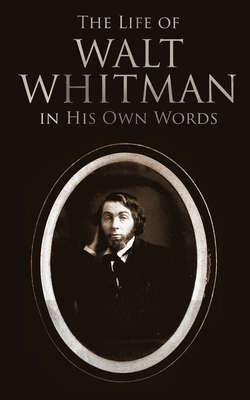Читать книгу The Life of Walt Whitman in His Own Words - Walt Whitman - Страница 39
На сайте Литреса книга снята с продажи.
SOME SPECIMEN CASES
ОглавлениеTable of Contents
June 18th.—In one of the hospitals I find Thomas Haley, company M, 4th New York cavalry—a regular Irish boy, a fine specimen of youthful physical manliness—shot through the lungs—inevitably dying—came over to this country from Ireland to enlist—has not a single friend or acquaintance here—is sleeping soundly at this moment, (but it is the sleep of death)—has a bullet-hole straight through the lung. I saw Tom when first brought here, three days since, and didn't suppose he could live twelve hours—(yet he looks well enough in the face to a casual observer.) He lies there with his frame exposed above the waist, all naked, for coolness, a fine built man, the tan not yet bleach'd from his cheeks and neck. It is useless to talk to him, as with his sad hurt, and the stimulants they give him, and the utter strangeness of every object, face, furniture, &c., the poor fellow, even when awake, is like some frighten'd, shy animal. Much of the time he sleeps, or half sleeps. (Sometimes I thought he knew more than he show'd.) I often come and sit by him in perfect silence; he will breathe for ten minutes as softly and evenly as a young babe asleep. Poor youth, so handsome, athletic, with profuse beautiful shining hair. One time as I sat looking at him while he lay asleep, he suddenly, without the least start, awaken'd, open'd his eyes, gave me a long steady look, turning his face very slightly to gaze easier—one long, clear, silent look—a slight sigh—then turn'd back and went into his doze again. Little he knew, poor death-stricken boy, the heart of the stranger that hover'd near.
W.H.E., Co. F, 2nd N.Y.—His disease is pneumonia. He lay sick at the wretched hospital below Aquia creek, for seven or eight days before brought here. He was detail'd from his regiment to go there and help as nurse, but was soon taken down himself. Is an elderly, sallow-faced, rather gaunt, gray-hair'd man, a widower, with children. He express'd a great desire for good, strong green tea. An excellent lady, Mrs. W., of Washington, soon sent him a package; also a small sum of money. The doctor said give him the tea at pleasure; it lay on the table by his side, and he used it every day. He slept a great deal; could not talk much, as he grew deaf. Occupied bed 15, ward I, Armory. (The same lady above, Mrs. W., sent the men a large package of tobacco.)
J. G. lies in bed 52, ward I; is of company B, 7th Pennsylvania. I gave him a small sum of money, some tobacco, and envelopes. To a man adjoining also gave twenty-five cents; he flush'd in the face when I offer'd it—refused at first, but as I found he had not a cent, and was very fond of having the daily papers to read, I prest it on him. He was evidently very grateful, but said little.
J.T.L., of company F, 9th New Hampshire, lies in bed 37, ward I. Is very fond of tobacco. I furnish him some; also with a little money. Has gangrene of the feet; a pretty bad case; will surely have to lose three toes. Is a regular specimen of an old-fashion'd, rude, hearty, New England countryman, impressing me with his likeness to that celebrated singed cat, who was better than she look'd.
Bed 3, ward E, Armory, has a great hankering for pickles, something pungent. After consulting the doctor, I gave him a small bottle of horse-radish; also some apples; also a book. Some of the nurses are excellent. The woman-nurse in this ward I like very much. (Mrs. Wright—a year afterwards I found her in Mansion house hospital, Alexandria—she is a perfect nurse.)
In one bed a young man, Marcus Small, company K, 7th Maine—sick with dysentery and typhoid fever—pretty critical case—I talk with him often—he thinks he will die—looks like it indeed. I write a letter for him home to East Livermore, Maine—I let him talk to me a little, but not much, advise him to keep very quiet—do most of the talking myself—stay quite a while with him, as he holds on to my hand—talk to him in a cheering, but slow, low and measured manner—talk about his furlough, and going home as soon as he is able to travel.
Thomas Lindly, 1st Pennsylvania cavalry, shot very badly through the foot—poor young man, he suffers horridly, has to be constantly dosed with morphine, his face ashy and glazed, bright young eyes—I give him a large handsome apple, lay it in sight, tell him to have it roasted in the morning, as he generally feels easier then, and can eat a little breakfast. I write two letters for him.
Opposite, an old Quaker lady sits by the side of her son, Amer Moore, 2d U. S. artillery—shot in the head two weeks since, very low, quite rational—from hips down paralyzed—he will surely die. I speak a very few words to him every day and evening—he answers pleasantly—wants nothing—(he told me soon after he came about his home affairs, his mother had been an invalid, and he fear'd to let her know his condition.) He died soon after she came.
